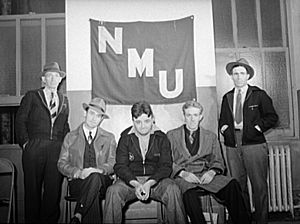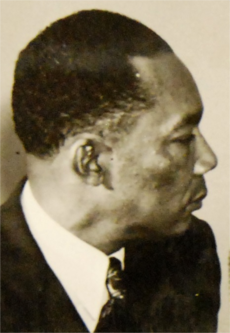Ferdinand Smith facts for kids
Ferdinand Smith (born May 5, 1893 – died August 14, 1961) was an important labor leader. He was born in Jamaica and became a strong voice for workers' rights. Smith helped start the National Maritime Union in the United States. He worked hard to make sure all workers were treated fairly. Many people remember him as one of the most powerful Black labor leaders in American history.
Contents
Early Life and Work
Ferdinand Christopher Smith was born in Savanna-la-Mar, Jamaica, on May 5, 1893. His father was a teacher.
First Jobs and Travel
Smith started working as a porter, carrying bags, and then as a waiter. He later moved to Panama. There, he worked in a hotel and as a salesman. In Panama, he first saw how unfair "Jim Crow" rules were. These rules separated people based on their race.
After World War I, Smith moved to Cuba to work. Then he came to Mobile, Alabama, as a sailor. For about 20 years, he worked on ships as a steward, managing food and supplies.
Joining the Labor Movement
In the 1920s, Smith joined the Marine Workers Industrial Union. This union worked to improve conditions for sailors. In 1936, he supported a big strike by maritime workers. He became part of its national committee.
Leading the National Maritime Union

In 1937, Ferdinand Smith became a vice president of the new National Maritime Union (NMU). This union grew stronger after big strikes and events like the Scottsboro Boys case. The NMU aimed to protect sailors' rights.
Fighting for Fairness
Smith strongly believed in treating everyone equally. He helped add a rule against discrimination to the NMU's constitution. In 1944, he made sure over 100 shipping companies agreed to this rule in their contracts.
He also supported civil rights for all people. He worked with groups like the National Negro Congress. In 1943, during a riot in Harlem, New York, officials asked Smith to help calm things down. He also worked with unions in the Caribbean.
Challenges and Changes
In 1944, it became known that Smith was a British citizen, not American. This caused some issues later on.
In 1945, he left his vice president role and the country. He soon returned legally and became the NMU's secretary. In 1948, the NMU removed Smith and others due to disagreements over union funds.
Later Years and Legacy
Deportation and Activism Abroad
In 1948, U.S. immigration officials arrested Smith. They said he was living in the country illegally. He was grouped with other labor leaders facing deportation. Many lawyers, including Lee Pressman, worked to defend them. Even singer Pete Seeger held a concert to raise money for Smith's defense.
Smith was eventually deported. He moved to Vienna, Austria, and worked for a global union group. In 1951 or 1952, he was deported again, this time to Jamaica. He continued his union work there, organizing sugar workers until he passed away.
A Lasting Impact
Ferdinand Smith died on August 14, 1961, in Jamaica.
His work left a big mark. In a famous 1943 mural called The Contribution of the Negro to Democracy in America, Smith is shown alongside other important Black figures. This shows how important his work was for African American communities.
Historian Peter Cole said that Smith used his position to speak out on many issues. He fought against unfair hiring practices and supported the independence of countries like Puerto Rico and India. Smith was seen as a smart and worldly leader who cared about workers everywhere.
Images for kids
-
Jim Crow sign for "colored" waiting room at bus station in Durham, North Carolina (1940)
 | William L. Dawson |
 | W. E. B. Du Bois |
 | Harry Belafonte |



